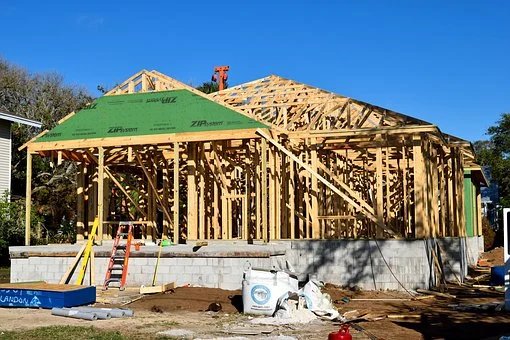

ICS Mortgages is reducing interest rates across its new residential variable and fixed-rate mortgages.
The lender said it will cut rates by up to 0.5% from next Monday 9 August.
Fixed interest rates will start from 1.95%, while variable interest rates will start from 2.45%.
Under these new rates, ICS said a typical first-time buyer taking out a 30-year mortgage of €250,000 could save more than €18,000 over the lifetime of their mortgage, when compared to the rates offered by one of the largest providers in the market.
That estimated saving is based on a €250,000 loan over 30 years, fixed for three years, with a Loan to Value of 90%, assessed against a similar mortgage offered by the one of the largest providers in the market, with a three year fixed rate of 2.55%.
“Buying a house is the single biggest financial decision most people will make in their lifetime. In recent years, however, Irish homebuyers have been offered a shrinking pool of options for how they fund such an essential purchase,” said Ray McMahon, Chief Commercial Officer at ICS Mortgages.
Mr McMahon said that favourable international financial market conditions allow them to now offer new residential customers reduced repayments.
Daragh Cassidy of price comparison website, bonkers.ie welcomed today’s news from ICS Mortgages.
“Strong competition is needed now more than ever as PTSB, AIB and BOI could end up with well over 80% of the mortgage market if the loan sales associated with Ulster Bank and KBC’s exits go through,” he said.
Mr Cassidy said ICS Mortgages is now only the second lender in Ireland, after Avant Money to offer a rate below 2%.
However, he said we shouldn’t lose sight of the fact that Ireland has among the highest mortgage rates in the Eurozone.
“The average rate on a new mortgage here is currently 2.80%, which is over double the currency bloc’s average of 1.27%,” he pointed out.
However Mr Cassidy said recent rate reductions from the non-bank lenders in particular, such as Finance Ireland, Avant Money and now ICS mean rates slightly closer to European levels are finally becoming more widely available.
“Avant Money, Finance Ireland and even ICS may not be familiar names to many mortgage seekers, who may be tempted to go to more well-known lenders such as AIB and BOI as their first port-of-call.
“However recent developments clearly show that it is the smaller, newer lenders who are offering some of the best value right now,” he said.
Meanwhile, Joey Sheahan, Head of Credit with MyMortgages.ie said the mortgage market has grown increasingly competitive both for first time buyers and those looking to switch mortgage or trade up.
“We predict a huge upswing in existing homeowners looking to switch to reduce their monthly payments on their variable rate mortgage, or to secure long-term cost certainty with one of the new fixed rate offers,” he said.
Mr Sheahan said a borrower could save €56,000 in interest by reducing rate from 2.95% to 1.95%.
He said that would be based on a €300,000 loan at 60% loan to value over 30 years.
Source: https://www.rte.ie/news/business/2021/0805/1239114-ics-mortgages-cuts-interest-rates/

Rates range from 2.40% to 2.99% and will be available for up to 90% loan to value mortgages.
Non-bank lender Finance Ireland is launching a range of long-term fixed rate mortgages for home owners in Ireland, with options up to 20 years available.
The company, which entered the residential mortgage market in 2018, will also offer 10 and 15-year fixed rate mortgages, with rates ranging from 2.40 per cent to 2.99 per cent, depending on the loan to value and the period.
The maximum term of 20 years is twice as long as currently available to Irish mortgage customers. Even then, the 10 year fixed rates are typically offered on loans with a loan to value of typically around 60 per cent, although some will offer on as much as 80 per cent loan to value.
Finance Ireland’s new products are targeting owner-occupiers, rather than buy to let investors, and could appeal to customers finishing fixed rates with existing lenders, including Ulster Bank and KBC Ireland who are set to leave the Irish market. The company distributes its mortgages through brokers. The State’s Ireland Strategic Investment Fund (ISIF) and US investment giant Pimco each hold 31 per cent stakes in the Billy Kane founded company.
The rates will be available for up to 90 per cent loan to value mortgages, and customers will be able to move their mortgages to new properties during the term without incurring penalties, Finance Ireland said.
The fixed rate can also be decreased as the loan is paid down versus the property value, and customers will be able to overpay up to 10 per cent of the outstanding mortgage balance as a lump sum in each year of the fixed term, should their financial circumstances allow.
Managing director Donal Doran said those details were essential to the product. “It’s very clear that you cannot put out a 20 year fixed rate without the flexibilities,” he said. “We’ve developed this based on feedback and what brokers believe their customers have been asking them.”
The loans will also allow for changes in personal circumstances, with the penalty for repaying the loan early capped at 5 per cent of the loan balance in the first five years of the loan term for 15 and 20 year loans, and 2.5 per cent for the following five years. In the final five years of the 20 year loans, no early redemption charge will apply.
‘Booster shot’
The move was welcomed by Brokers Ireland, who said it gives a “booster shot” to competition and brings security to Irish mortgage holders.
“We have always maintained that mortgages are long-term products for which lenders can readily source long-term funding. That makes them very secure – for consumers and for lenders,” said Rachel McGovern, director of financial services at Brokers Ireland. “That they are only now entering the Irish market indicates just how staid, unimaginative and above all non-consumer-friendly the Irish mortgage market has been. In fact 10 year mortgages have only been introduced in recent years.”
However, she noted the rates were still higher than in other European countries, where long-term fixed rates have been the norm for years.
The announcement was a “good news day for new and existing mortgage holders”, said chairperson of the Association of Irish Mortgage Advisors Trevor Grant.
The country had become “accustomed to accepting uncertainty around the cost of financing our home purchases”. “If a developer told us the price of a house could be €300,000 or maybe €350,000 or possibly even €400,000 and that they could only confirm the price after we bought the house, we’d run a mile, yet we seem to accept uncertainty when it comes to the cost of mortgages.”
Managing director of mortgage advice company doddl.ie, Martina Hennessy, said the news was “a boost to the broker market”. “Crucially, if you stay with Finance Ireland and you move house, you can transfer the rate on your current mortgage to your new home without incurring a penalty.”
The move is likely to put pressure on other lenders to see them follow suit, said
Joey Sheahan, head of credit at MyMortgages.ie.
“This news from Finance Ireland is really likely to shake things up – both in terms of how mortgage holders approach their choice of term and rates, and in the fact that if the demand for these products are strong, other lenders will make moves to bring similar offerings on stream.”
‘Significant innovation’
Mr Kane, chief executive of Finance Ireland, said, “I’ve been involved with the Irish mortgage market for over 30 years and I believe that this is one of the most significant innovations made here in that time,” said.
Finance Ireland entered the home loans market in late 2018 after it bought Pepper Money’s €200 million home loans portfolio and mortgages platform, with UK asset manager M&G Investments providing the funding.
It was forced to abandon plans for a €100 million-plus initial public offering in May 2020 as the rapid spread of Covid-19 globally threw equity markets into turmoil. Mr Kane, a former chief executive of Irish Permanent said last month it would look at floating on the stock market in the second half of next year at the earliest.
Source: https://www.irishtimes.com/business/financial-services/finance-ireland-first-to-offer-20-year-fixed-rate-mortgages-1.4563959

With Irish people reported to have saved more than €13b during the pandemic, while adapting to remote working and achieving a better work/life balance, many are now looking to take control of what happens next as they consider their future.
The pandemic triggered a lot of new perspectives for Irish people, not least around lifestyle, family well-being and the home. Remote working became a catalyst for change as the daily commute disappeared and people have had more time to look around at their homes and how it meets their family needs. The appetite for building, extending and trading up and even away from urban locations to more space, amenities or proximity to the family network is growing. Here we look at what’s involved in trading up, and if it’s the right time to move to a property more suited to your needs? Before you take that step onto the next rung of the property ladder Joey Sheahan, Head of Credit at MyMortgages.ie and author of The Mortgage Coach recommends some key steps as you plan your next move:
Hold onto your cash
If you are thinking about trading up, it’s wise to keep your powder dry, i.e. hold onto your cash reserves. Lenders want to see that you have 6 months of savings to cover your mortgage repayments in the event of unexpected expenses and in order to avoid early default. Just to be clear, cash or liquid assets include balances in current and savings accounts and investments such as stocks, shares or cryptocurrency. There are a few actions you can take to free up cash, if required, so you have the requisite cash reserves:
– Stop overpaying your mortgage now. If you’ve been paying extra every month or on an ad-hoc basis to reduce the term of your mortgage, bring your repayments back to the terms of the mortgage agreement. Use that extra cash to build up your savings.
– Don’t use cash reserves to make any sizeable purchases. If you absolutely need to
change your car, for example, take out the maximum loan over the longest period
and at the lowest interest rate instead.
– Delay making any unnecessary purchases using cash or credit until after the
mortgage process has been finalised.
You’ve prepared the groundwork: reduced your outgoings, built up your savings, but you’re still struggling to come up with the 20% deposit required as you are a non-first-time buyer. An example can help show the way.
Mark and Aisling plan to sell their two-bedroom apartment for €300,000 and buy a four-bedroom house for €400,000. Because they are second time buyers, they are limited to a loan amount of €320,000 (i.e. 80% LTV). They had €50,000 cash savings. However, they need to sell their existing apartment to fund the balance of the deposit. Their loan on the apartment is c.€200,000 so they should net c.€90,000 after selling expenses such as auctioneers and legal fees have been deducted. This process of selling one property and purchasing another simultaneously can be challenging so some people will firstly sell their existing property so that they have cash in the bank. Then, either move in with family or rent a property so that they are a stronger buyer for the house that they wish to trade up to and are not dependent on the sale of their existing property.
Central Bank Rules for Second-Time Buyers
In February 2015, the Central Bank introduced a range of measures for mortgages aimed at maintaining financial stability and protecting consumers. The measures set limits on the size of mortgages that consumers can borrow based on loan-to-value (LTV) and loan-to-income (LTI). Under LTI rules, a limit of 3.5 times gross income applies to all borrowers. First-time buyers can borrow up to 90% of property value. Second-time and subsequent buyers can borrow 80% of the property value only, which of course also applies to people looking to trade up.
Exemptions
If you’ve explored all avenues and still can’t come up with the 20% deposit, you may be able to avail of an exemption. There are two types of exemptions available, but lenders may grant an exemption under the loan to value rule or the loan to income rule, but not both.
I’ve found that most of the applications for exemptions to the Central Bank rules are from second-time buyers.
Loan to Value
Lenders can apply exemptions up to 20% of the total value of home loans that they grant to second and subsequent buyers. This means that it’s possible for second-time buyers to borrow up to 90% of the purchase price, reducing the deposit required to 10%. Under current rules, someone trading up to a house with a purchase price of €350,000 would require a deposit of €70,000, but just €35,000 if they got the exemption that meant the LTV increased to 90 per cent.
Loan to Income
Under loan-to-income exemptions, lenders can circumvent the 3.5 times gross income rule in 10% of second-time cases. It is possible to get the gross income multiple increased to four or even 5 times an applicant’s combined annual gross income (i.e. before tax).
Being granted an exemption of this kind can make a significant difference to the amount. you can borrow. For example, a couple with a combined income of €100,000 can borrow €350,000 under the rules. If they can get an LTI exemption, they can potentially borrow up to €500,000.
Take the example of Mary who previously owned an apartment with an ex-boyfriend. She wants to buy a house now. Despite saving hard for two years and keeping a clean credit and banking record, she’s 2% to 3% short of the 20% deposit.
An opportunity has come up to buy her dream house and at a great price, as the sellers are emigrating and are looking to sell quickly. Lenders tend to prefer applicants who have a particular property in mind and will complete the transaction in the short-term. With the assistance of a good broker, buyers like Mary who tick the right boxes may be able to secure an exemption from her bank under either the LTV or LTI rule.
Decisions are made on a case-by-case basis. Most lenders will require a minimum level of income; for example, a sole applicant will need an income of €40,000 or joint applicants will be earning at least €70,000, but this varies from bank to bank.
Remember, as stated earlier, you can apply either for a greater LTI multiple or a higher LTV, but not both.
Note: if you receive an exemption on the loan to income rule, allowing you to increase the amount you can borrow, you will need a bigger deposit.
It’s also worth noting that if the gap between what you need to borrow and what you can under the current rules is relatively small, e.g. €10,000 or so, it’s unlikely your bank will “give up” an exemption as it’s the whole loan that is classified as an exemption as opposed to just the amount of €10,000 over 3.5 times the income.
In conclusion, trading up can be more straightforward than people may think. With the right advice from an authorised mortgage broker, who will navigate you through this process, approval can be obtained even if your situation is not clear cut at the outset. There is some excellent value in properties at the moment so the best advice is to do the research and groundwork now and be ready to make your move when the time is right for you!

Q.
Should I avail of a moratorium? Will it cost me more?
A.
I believe that the demand for moratoriums will have reduced drastically this week following the Government’s announcement of the Covid 19 Wage Subsidy Scheme where Revenue will pay 70% of employees salaries up to a limit if €410 weekly (ie €1,775 monthly) and the increase in the Covid unemployment benefit to €350 weekly (ie €1,515 monthly) from €203. Given that it’s very difficult to spend money at present, most people should be able to meet their monthly financial commitments in the short term based on the above supports.
If you have been made redundant and cannot meet your monthly repayment, contact your bank immediately and apply for a moratorium it.
If you qualify but don’t need it, then don’t rush into it.. this choice can occur where somebody has been made redundant, has a mortgage repayment of say €1,000 monthly but may have savings of say €20,000. In this instance you can use €3,000 of your savings to pay your mortgage for 3 months. The reason why some people won’t avail of the moratorium is that if they wish to borrow again in the next couple of years, availing of the moratorium may go against them in terms of being approved for a new mortgage. As it stands most banks will want you to be making full repayments for 2 years after a moratorium before they will approve a mortgage. Also.m, a borrower will pay more interest in the long term.
For example a borrower has €350,000 outstanding with 32 years remaining and a variable interest rate of 3.15%. Monthly payments are €1,447.83 monthly. If they don’t make payments for 3 months they will pay an additional €2,651 interest on the 3 months deferred payments of €4,546 over the remaining 31 years 9 months.
Read the full article by Charlie Weston in the Sunday Independent here –
https://www.independent.ie/business/personal-finance/your-questions-im-worried-stock-market-turmoil-has-hit-my-pension-should-i-be-taking-action-39120072.html

Q My job in catering has been lost as a result of the coronavirus. It’s a large company and we’re told the layoff is temporary. My mortgage is with AIB and they are offering a three-month payment holiday on the repayments. But I understand it’s another loan of sorts? Should I take it or continue to pay the mortgage out of savings? My wife is still working full time and we could afford to do this. The payments are €1,240 p.m. and we have 16 years left on the loan.
A The mortgage moratorium has been billed as a bit of a payment ‘holiday’. It is no such thing. All that will happen is the three months’ payments will be rolled up and added on to the end of your loan, extending out the term. This has the effect of rolled up interest too, so the sums should be done very carefully before you decide.
Joey Sheahan, author of The Mortgage Coach, says: “As your wife is still employed and you can afford to meet the monthly repayment, I would strongly advise to continue making it. If your wife was not working and you did not have any savings, then you may not have a choice but to avail of a payment holiday/moratorium.
“The word ‘holiday’ indicates a pleasant experience, however anyone who avails of a moratorium will ultimately pay more interest over the life of their mortgage as you are deferring repayments of €3,720 in your case. Additional interest of around €968 would be paid on €3,720 over 16 years, assuming an interest rate of say three per cent. Another factor in making a decision on this is if you are planning on applying for a new mortgage in the future (for example if you were to switch your existing mortgage or move house).
“Based on current credit policy, which each bank sets on its own, some banks may not approve your new mortgage application if you have availed of an alternative repayment arrangement (which would include a moratorium/payment holiday) within the two years prior to applying for a new mortgage.”
So, do your own sums, but also ask the bank to outline, specifically, in writing exactly what it will cost you before committing.

Ten years on from the last financial crisis, recession looms once … Our muscle memory is strong, and there are things you can do right now to ease your finances and your mind. … more interest in the long term, says Joey Sheahan of mymortgages.ie.
If you have a rainy-day fund start eating into it now
We didn’t think we’d be back here again so soon. Ten years on from the last financial crisis, recession looms once more. But there’s a difference this time round: we’ve navigated these waters before. Our muscle memory is strong, and there are things you can do right now to ease your finances and your mind.
Mortgage
Keeping a roof over your head will be your biggest priority. With estimates that up to 350,000 people, or one in six of the working population, will lose their jobs as result of the Covid-19 pandemic, banks should be as worried about mortgage default as you are.
…
Ten years on from the last financial crisis, recession looms once … Our muscle memory is strong, and there are things you can do right now to ease your finances and your mind. … more interest in the long term, says Joey Sheahan of mymortgages.ie.
Read the full article by Joanne Hunt in the Irish Times here – https://www.irishtimes.com/business/personal-finance/how-to-budget-your-way-through-financial-realities-of-covid-19-1.4216004?mode=sample&auth-failed=1&pw-origin=https%3A%2F%2Fwww.irishtimes.com%2Fbusiness%2Fpersonal-finance%2Fhow-to-budget-your-way-through-financial-realities-of-covid-19-1.4216004

Rates are coming down due to more competition between lenders, according to Joey Sheahan, head of credit of MyMortgages.ie and author of ‘The Mortgage Coach’.
“But there is still a gulf between what our lenders are charging and what our European counterparts are offering their mortgage holders.
MORTGAGE rates in this country have fallen below 3pc for the first time in years.
But there is scope for much deeper cuts, mortgage experts said.
New figures show home buyers in this country with new mortgage agreements are still paying double the average rate in the rest of the Eurozone despite the fall in rates.
This is costing the typical new buyer €2,000 more a year than their European counterpart.
The average rate paid on a new mortgage in this country was 2.88pc in December, the Central Bank said.
This was down 13 basis points on the same month in the previous year.
However, the average rate being paid in the Eurozone is half of the one in this country, at 1.37pc.
Ireland is the second most expensive country in the Eurozone for mortgage rates after Greece.
…
Rates are coming down due to more competition between lenders, according to Joey Sheahan, head of credit of MyMortgages.ie and author of ‘The Mortgage Coach’.
“But there is still a gulf between what our lenders are charging and what our European counterparts are offering their mortgage holders.
“We would hope that this gulf will continue to narrow over the coming years. We believe that there is scope for a cut of up to 0.25pc on some fixed rate terms,” he said.
Daragh Cassidy of price comparison site Bonkers.ie said the average first-time buyer mortgage in Ireland is around €225,000.
This means someone borrowing this amount over 30 years is paying almost €172 extra a month or over €2,058 a year compared to our European neighbours.
“That’s money that could be put to far better use,” he said.
He advised potential first-time buyers who are at the start of the mortgage journey to do their research.
“While the average new mortgage rate in Ireland is still close to 3pc, there are now rates as low as 2.25pc on offer,” he said.
Read the full article by Charlie Weston here –
https://www.independent.ie/business/personal-finance/mortgage-rates-drop-below-3pc-central-bank-38957118.html

One thing you may not have considered is Revenue’s Help-to-Buy (HTB) scheme. Because you want to buy a new-build, you may well be eligible, according to Joey Sheahan, head of credit with MyMortgages.ie and author of the newly released ‘The Mortgage Coach’.
If you qualify for the HTB scheme, you can claim up to 5pc of the purchase price of the house as a tax rebate
Your Questions
Q: My partner and I are renting a three-bed house in Galway for €1,300. We have just learned that we will be having our first baby at the end of the year and we would absolutely love to have our own home by then. We both have secure incomes as young teachers of €35,000, but we are really struggling to get a deposit together. The property we have our eye on is €270,000 and in a new development near where we already live. We have €5,000, and gifts from our parents will bring that up to €15,000. But that is still not enough. Is there any help out there for us?
A: One thing you may not have considered is Revenue’s Help-to-Buy (HTB) scheme. Because you want to buy a new-build, you may well be eligible, according to Joey Sheahan, head of credit with MyMortgages.ie and author of the newly released ‘The Mortgage Coach’.
To give you an idea of where you stand, you will need a total of around €32,400 to purchase the property.
This is made up as follows: 10pc, or €27,000, as a deposit, plus 1pc stamp duty of €2,700, and 1pc, or €2,700, toward legal costs.
Read the full article by Charlie Weston here –
https://www.independent.ie/business/personal-finance/we-need-to-buy-a-home-with-a-baby-on-the-way-is-there-help-available-38958512.html

MyMortgages.ie spokesman Joey Sheahan said he expects competition to “heat up”.
He added: “Existing and prospective mortgage holders should take note – there is great value on fixed rates.
“If you are applying for a mortgage, then you absolutely need to look at what all lenders are offering.
“And if you are already tied into a mortgage contract, then you should look at what your switching options are.”
Mortgage experts say homeowners could save up to €100,000 by switching to the lowest rates.
With specialists predicting the competition will begin to “heat up”, AIB has become the latest bank to announce a cut in its fixed loans.
It was claimed 220,000 borrowers currently on standard variable rates of up to 4.5% could benefit.
AIB announced yesterday it is cutting its three and five-year fixed rates from 2.85% to 2.55% and its green five-year fixed rate from 2.5% to 2.45%. This is its second mortgage rate reduction in less than 12 months.
…
Meanwhile, MyMortgages.ie spokesman Joey Sheahan said he expects competition to “heat up”.
He added: “Existing and prospective mortgage holders should take note – there is great value on fixed rates.
“If you are applying for a mortgage, then you absolutely need to look at what all lenders are offering.
“And if you are already tied into a mortgage contract, then you should look at what your switching options are.”
Read the full article here –
https://www.dublinlive.ie/news/business/homeowners-could-save-up-100000-17808147

“Prices are stabilising but many first-time buyers are still struggling.
“There can be no doubt that thousands have stable incomes and can afford mortgage repayments, but need help to get that initial leg up on the property ladder.”
House prices have increased by more than 80% from their lowest point in 2013.
The latest Residential Property Price Index, issued by the Central Statistics Office (CSO), shows that prices are continuing to increase, albeit at a slower rate than this time last year.
In 2019, property prices increased by 0.9%. In 2018, the rate of increase was 6.3%.
…
Joey Sheahan, head of credit at MyMortgages.ie, said, “Prices are stabilising but many first-time buyers are still struggling.
“There can be no doubt that thousands have stable incomes and can afford mortgage repayments, but need help to get that initial leg up on the property ladder.”
Brokers Ireland echoed this sentiment, noting that first-time buyers are experiencing “continuing difficulty” in accessing the market.
Read the full article here –
https://www.irishexaminer.com/breakingnews/ireland/house-prices-have-increased-over-80-from-lowest-point-in-2013-981573.html

Charlie Weston
Question: I have just been promoted at work and got a pretty big pay increase. I am going to treat myself and the family to a holiday this year, as we have not been able to afford one since we bought our home two years ago. My wife thinks maybe we should throw an extra few euro on the mortgage each month, but I am not sure. Maybe we should just save it?
regulated by the Central Bank of Ireland.
© 2017-2021 MyMortgages.ie. All Rights Reserved.
Terms of Business
Privacy Policy